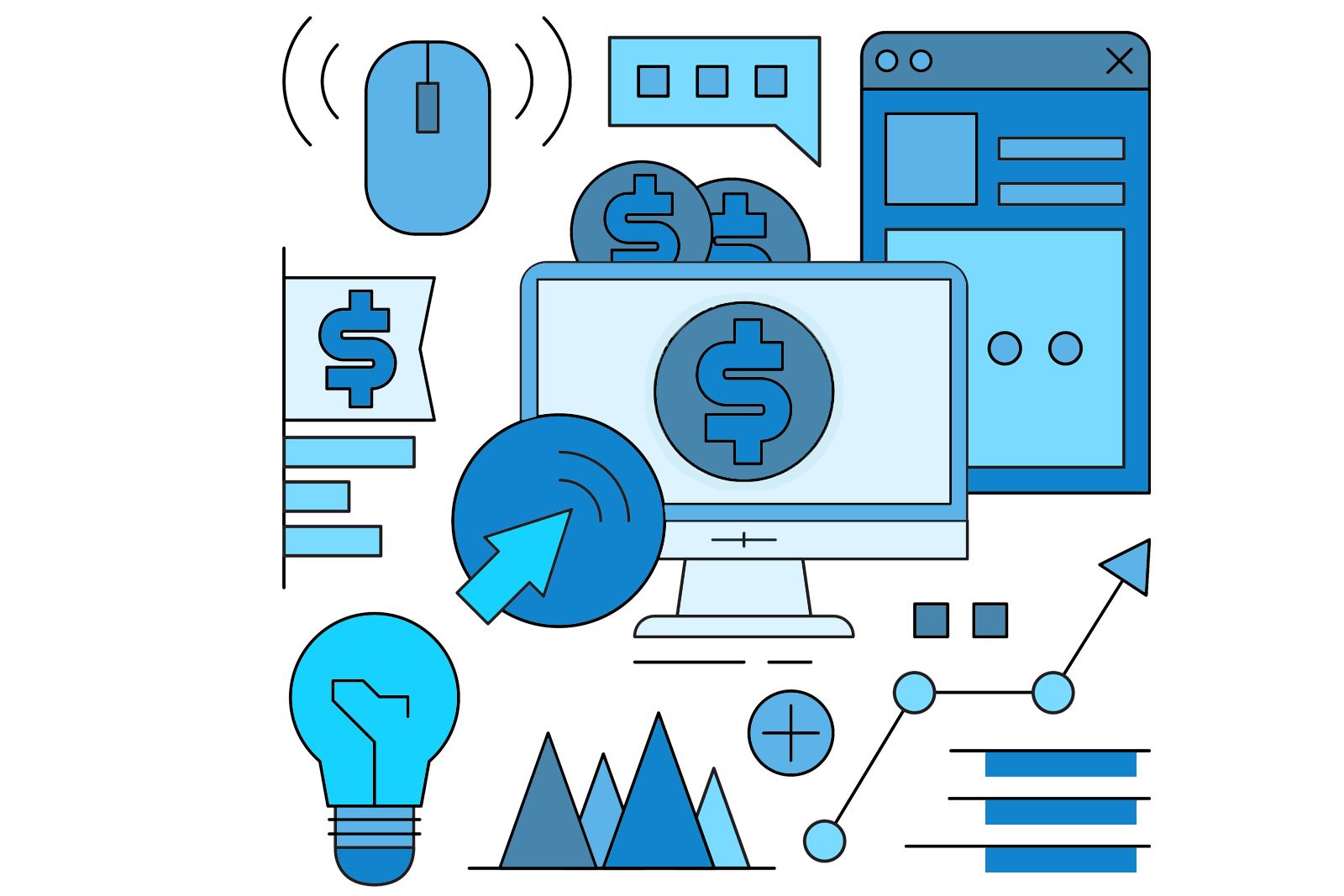DEBT CONSOLIDATION
HIGH RISK MERCHANT ACCOUNTS FOR DEBT CONSOLIDATION COMPANIES.
FASTER APPROVALS. COMPETITIVE PRICING. BETTER SERVICE.

HIGH RISK MERCHANT ACCOUNTS FOR DEBT CONSOLIDATION COMPANIES.
FASTER APPROVALS. COMPETITIVE PRICING. BETTER SERVICE.
In times of economic hardship, debt consolidation specialists help consumers deal with short-term crisis situations. Studies have shown that consolidating unsecured liabilities in difficult times can alleviate stress, optimize cash flow and help consumers meet financial obligations and protect their credit scores. Growing adoption and increasing demand for these solutions have propelled debt consolidation into one of the fastest growing sectors in financial services.
DigiPay Solutions has created a “Debt Consolidation Industry Primer” with important information about setting up a merchant account, controlling chargebacks, managing risk and keeping merchant accounts in good standing.
DigiPay Solutions is a recognized payment processing brand among leading debt consolidation service providers. The company’s extensive network of partner banks, payment experts and elite portfolio of tailored solutions has helped launch entrepreneurial start-ups and take enterprise organizations to the next level of corporate growth.
Thousands of merchants, from start-ups to enterprise-scale organizations, leverage DigiPay’s curated knowledge of high-risk payments to securely process hundreds of millions across an array of vertical industries. DigiPay works closely with debt consolidation partners, providing tailored solutions and timely advice to national and regional service providers, while helping them maintain the highest standards of banking and payment card industry compliance.
DigiPay’s team of experts, combined with our partners’ proven record of successful debt consolidation services, can facilitate successful new company launches and help existing businesses grow and scale.
The debt consolidation industry expanded rapidly on the heels of the Great Recession of 2008, as consumers sought relief from high levels of unsecured debt. Debt consolidation products and services come in many different forms, from balance transfers to lines of credit to short-term loan products, all designed to repackage debt into a manageable package to benefit borrowers and creditors alike. The need for secure and reliable credit card processing has grown in parallel with the debt consolidation industry and its expanding array of products and services.
Student Loan Hero cites credit card debt as the leading segment of U.S. debt in 2017, estimated to be $764 billion. Credit card debt averages $4,061 per cardholder and $6,662 per household. With average APR credit card rates of 13.61 percent and mortgage balances of $106,132, the debt consolidation pipeline will remain robust for the foreseeable future.
Debt consolidation consultants and service providers are categorized by SIC Code, NAICS Code and Visa Merchant Category Code (MCC) to comply with payment card industry requirements.
Proper classification is vitally important to prevent funds from being held in reserve for misrepresentation. Of note, to date, Debt Consolidation does not have a specific SIC, NAICS or MCC code and can be classified under different general industry codes, depending on the nature and focus of services. Following are some examples:

The diversity of debt consolidation service companies, ranging from independent specialists to lending and financial institutions, provides abundant choices of providers and programs focused on improving financial health.
Here are some examples of companies in the space:
(NYSE: WFC): established in 1852 and based in San Francisco, is a community-based financial services company that provides banking, insurance, investments, mortgage, and consumer and commercial finance through more than 8,500 locations, 13,000 ATMs, online and on mobile devices. The company has offices in 42 countries and territories and $2.0 trillion in assets. Ranked No. 25 on Fortune’s 2017 rankings of U.S. companies, its mortgage and student loan divisions are among the largest debt consolidation companies in the United States.
Purchased in 2002 by Intuit, Detroit, Mich.-based Quicken Loans is the largest online retail mortgage lender and second-largest retail lender in the United States. The company moved its Michigan employees to downtown Detroit in 2011, where it has participated in the city’s economic recovery and growth. More than 15,000 Quicken Loans team members currently work in the company’s downtown Detroit headquarters.
Headquartered in New York City, National Debt Relief helps consumers with $7500 or more unsecured debt by consolidating creditor payments and reducing monthly payments. The company claims it has saved clients who graduated from its program an average of $6,296. Clients who stay with the program and settle their debt realize approximate savings of 50 percent before fees, or 30 percent including our fees, over 24 to 48 months, company representatives stated.
Established in 1996, CuraDebt works with clients who have $10,000 or more in unsecured debt. In addition to consolidating debt, the company negotiates with creditors, offers debt management, settlement, credit counseling and arbitration services to individuals and small business owners. The company does not operate in Colorado, Connecticut, Georgia, Iowa, Idaho, Illinois, Kansas, North Dakota, New Hampshire, South Carolina, Vermont, Washington, Wisconsin and West Virginia.
Charlotte, N.C.-based LendingTree LLC is a consumer marketplace lender that connects borrowers with a variety of lenders that can consolidate debts ranging from $1,000 to $35,000. Borrowers can shop online for lenders, reviewing terms and conditions before choosing a lender that best meets their requirements.
CareOne Debt Relief Services, a consortia of debt consolidation providers, matches consumers with the best debt consolidation options for debts as low as $2,500. Participating debt consolidation companies must meet qualifying criteria to become a CareOne Debt Relief Services provider. Requirements include making account information available 24/7, providing monthly statements and delivering consistently stellar customer service.
With your great brand story and DigiPay Solutions as your processing partner, there’s no limit to how far you can scale your company. DigiPay’s diverse, extended family of debt consolidation professionals process anywhere from $20,000 to millions in monthly revenue.
Interested in learning more about Publicly Traded Debt Consolidation Companies listed on Major U.S. Exchanges?

The debt consolidation industry brings a consultative focus to debt management and financial wellbeing. Debt consolidation loans offered by banks, credit unions, mortgage lenders and independent agencies are designed to help consumers reorganize debt. Methodologies may include transferring credit card balances, applying for home equity loans or lines of credit or securing a personal loan to consolidate payables.
Numerous consumers have reported that working with professional debt consolidation specialists has helped them reduce debt burdens, interest rates and monthly payments and put them on a path to financial recovery.

Home Equity Loans, Credit Lines: A home equity loan uses available equity in a residence as collateral. Qualified borrowers must a reasonable amount of equity in their homes and good credit. While interest rates tend to be lower on home equity loans, failure to make payments on time can result in foreclosure, adding considerable risk to this type of debt consolidation.
Credit Card Balance Transfers: Balance transfers involve consolidating multiple debts onto a new or existing credit card that offers a zero balance or lower rate for a fixed amount of time. The card must also have a high enough credit limit to accommodate the balance transfers. Borrowers must pay off the balance before the rate readjusts and the regular rate goes into effect. Additionally, putting a high balance on a single credit card can affect a consumer’s debt ratio and credit score, credit analysts have noted.
Personal Loans: A personal, unsecured loan with fixed payments over a fixed period is another popular method of debt consolidation. Interest rates are typically based on a borrower’s credit score and history. Once approved, consumers can use it to consolidate debts.
Due to the highly competitive nature of the debt consolidation industry, companies that specialize in a vertical industry or niche have been shown to outperform generalist debt relief companies. Among the challenges facing the industry is the rapid decline of consumer debt following the 2008 recession, due to several factors. As consumers paid their loans, defaulted or filed for bankruptcy protection, stricter credit guidelines and economic uncertainties restricted access to credit, decreasing the number of eligible prospects for debt consolidation and stifling demand for debt relief in general. Additionally, the Consumer Financial Protection Bureau (CFPB) has challenged debt counselors and debt consolidation companies on several fronts, concerned that the companies were not fully disclosing fees and pricing to consumers.
“Many people get into debt because they can’t afford to make monthly debt payments on top of paying for daily living expenses,” states the CFPB website. “If you’re not sure of the best way to handle your debt, a credit counselor can also help you explore your options.”
Establishing a merchant account to process payments is the first step in enabling commerce. Debt consolidation is classified as a high-risk business, which means industry service providers are ineligible to apply for merchant accounts at numerous sponsoring banks. DigiPay’s expanded network of banking relationships accepts the debt consolidation business category and provides competitive rates, terms and conditions.
Debt consolidation practitioners find it advantageous to work with processing partners who are familiar with their industry, jargon and common business practices. Payment processing sales representatives who are not familiar with non-traditional forms of finance may be less effective at managing relationships, due to their learning curves. When debt consolidation companies work with knowledgeable processing partners, they can save time and money, improve efficiencies and attract and retain more customers and followers.

Many banks will not accept debt consolidation merchants due to industry’s higher-than-average number of chargebacks. Debt consolidators, especially entrepreneurial start-ups, may be unfamiliar with related risks of working with consumers whose high debt ratios and credit challenges increase the likelihood that they will default on a loan, file for bankruptcy or initiate a chargeback on a recurring payment due to their inability to pay or misunderstanding of terms and conditions. Clients who consolidate debt may not recognize the extent of their indebtedness, or the fact that repackaging the debt doesn’t remove their obligation to repay.
Here are some risks commonly associated with professional debt consolidation:
Consumers who opt in to a repayment plan with automatic monthly payments may forget that their credit card will automatically be billed every month. They will then dispute the charge that appears on their credit card statement. Many card issuing banks require consumers to contact the merchant before they process a chargeback request.
Consumers who do not receive the results they expected from debt consolidation may initiate a chargeback. They do not even have to prove the company made an exaggerated claim. They only need to demonstrate that a debt consolidation company or specialist suggested that they could become debt-free or improve their credit rating by following the program to win a dispute. Regulatory compliance regarding financial solvency and truth-in-advertising creates additional exposure for debt consolidation specialists.
Debt consolidation start-ups in the early stages of setting up their businesses may not have the appropriate levels of customer service support to deal with consumer complaints and inquiries. Consumers who are unable to communicate their concerns to merchants are at increased risk of turning to payment card issuers for refunds and chargebacks.
Yes, at DigiPay debt consolidation is in our DNA. As financial services specialists, we are familiar with the industry’s unique framework and diversity of categories, business models, SIC and NAIC codes and VISA MCC. We underwrite our merchants before sending their applications to our sponsor bank.
Once new merchants establish credibility and trust with DigiPay banking partners, they receive personalized attention and ongoing risk management from DigiPay’s team of payment specialists. This personalized service, coupled with the sheer volume of transactions we process through multiple banks, ensures our merchants receive the highest level of service and support.
Choosing the right payment processing partner is critical, because without the ability to accept payments, merchants are out of business. DigiPay’s merchant onboarding process combines sophisticated technology with human oversight. Experienced underwriters who understand the debt consolidation industry, and have expertise in payment card brand and banking industry compliance, bring a refreshingly holistic approach to new account set-ups.
Whether a debt consolidation business is a repayment program, personal loan, balance transfer or home equity line of credit, DigiPay Solutions will give every merchant the attention and resources they deserve and a one-stop shop for processing solutions. The debt consolidation industry is growing and DigiPay can accelerate that growth. The first order of business is eliminating any barriers to progress. Look no further than DigiPay Solutions, where getting a merchant account will open doors to a bright and prosperous future.
Because of the higher risk associated with debt consolidation, more due diligence is required during the new merchant onboarding process. This means underwriters need to review a range of documents to assure the business is compliant, financially sound, and a good credit risk. DigiPay is unique because we underwrite merchants in-house before we submit their applications to the bank. Because our team of underwriters is experienced in high-risk, your business is presented to the bank with all required documents and full disclosure, to engender trust and stability.
Presenting your business in the best possible light from point of first contact is important because merchant accounts are essentially a line of credit from a processor. Because high-risk merchants have higher chargeback ratios and regulatory exposure, financial institutions are concerned they may violate card brand rules, laws and regulations. Complaints to the FDA and the FTC against a merchant create liability not only for merchants, but can also hold processors accountable under Know Your Customer (KYC) regulations.
DigiPay’s in-house team of underwriters and risk managers have curated knowledge in all areas of high risk. We are best qualified to guide you through the process efficiently and painlessly while helping to present your business to increase approval and gain credibility.

Once a high-risk debt consolidation merchant account is approved, payment processors set monthly processing limits, typically between $10,000 and $30,000 per month, for the first three-to-six-months. This gives processors time to develop a customer risk profile by evaluating payment flows, average ticket sizes, processing levels and chargeback ratios.
Debt consolidation companies that maintain a stable, consistent performance throughout their initial trial periods can usually increase their processing limits. DigiPay’s risk management team works with merchants and sponsoring banks to shorten trial periods and raise processing limits.
Maintaining a low chargeback ratio is key to maintaining a healthy merchant account. When chargebacks exceed card brand maximums, your merchant account is at risk of being shut down. If a merchant category has consistently excessive chargebacks, banks will sometimes shut down an entire vertical industry. For this reason, it is critical for high risk verticals to self-regulate and work collaboratively to establish industry best practices.
Ryan Fritzsche, a payments industry veteran who has served as President and Founder of successful chargeback management organizations, leads DigiPay’s Debt Consolidation Business division. Ryan brings a deep level of understanding and expertise to chargeback management. Keep reading for his expert advice.

Keeping track of your Transaction Chargeback Ratio as well as your Volume Chargeback Ratio is critical because this is what Visa, Mastercard and payment processors monitor. Payment processors with high chargeback ratios in their merchant portfolios can trigger unannounced audits by Visa or Mastercard. For this reason, DigiPay, powered by TranZlytics, closely monitors chargeback and refund ratios, reacting quickly to spikes in activity. Excessive refunds, frequently the result of alerts, can be a sign of fraud or poor business practices, information the card brands and banks may consider when assessing risk.
The formulas shown below use simple math to derive Transaction Chargeback, Volume Chargeback and Refund Ratios:
Add total monthly number of chargebacks and divide by total monthly number of transaction. For example – if during a month you processed 500 sales, and there were 10 chargebacks, your chargeback ratio would equal 10/500, or 2.00%.
Add total monthly dollar amount of all chargebacks and divide by the total monthly sales volume.
For example – if during a month, you processed 500k in sales, and your chargebacks were 10k, your chargeback ratio would equal 10/500, or 2.00%.
Add total monthly number of refunds and divide by total monthly number of transactions.
For example – if during a month you processed 500 sales, and there were 10 refunds, your refund ratio would equal 10/500, or 2.00%.
Add total monthly dollar amount of all refunds and divide by the total monthly sales volume.
For example – if during a month, you processed 500k in sales, and your refunds were 10k, your refund ratio would equal 10/500, or 2.00%.
It is important not to ignore chargebacks, because win/loss ratios matter. Visa and Mastercard can impose penalties and fines in the tens of thousands on payment processors and their sponsoring banks for continuing to process transactions for merchants that exceed the permissible 2 percent chargeback ratio. Non-compliant processors and banks may also be subjected to further scrutiny and potential shut-down by card brands and regulators.
Here are some recommended ways to maintain low chargeback and refund volume ratios:

Merchants can handle chargebacks in-house or outsource to a Chargeback Mitigation Specialist. The following companies are experienced in identifying all forms of fraud, including friendly fraud. They will investigate chargeback claims and retrieval requests on behalf of merchants:
Many debt consolidators rely on eCommerce and Mail Order/Telephone Order (MOTO) sales to scale their businesses. Credit card payments transacted online or by phone are called Card Not Present (CNP) transactions. Online CNP transactions involve credit card gateways that transmit payments from merchants to their payment processors.
Following is a list of recommended attributes of payment gateways that address the unique requirements of debt consolidation industries:
Many debt consolidation companies need multiple merchant accounts to support their diversified array of training programs. Gateways should ideally be able to manage multiple merchant I.D.s organized under one master MID relationship.
Payment gateways need to seamlessly integrate into CRMs, POS systems, third-party software, and eCommerce shopping carts to facilitate all forms of online, MOTO and in-store commerce.
Professional debt consolidators need access to a variety of real-time reports and transaction data to grow and scale their businesses and manage chargebacks and refunds.
In addition to enhanced reporting, debt consolidation merchants need secure access to transaction data from anywhere they happen to be working, with built-in permission levels to facilitate all levels of employees and management.
Payment gateways must comply with the Payment Card Industry Data Security Standard (PCI DSS). Ask your gateway provider if they are PCI DSS compliant and verify their certificate annually. Debt Consolidation merchants also need a gateway with a data vault for tokenization of credit card numbers and encryption of customer personally identifiable information (PII).
Tokenization replaces a Primary Account Number (PAN) with a randomly generated set of numbers and records this in the data vault. This is to prevent hackers from accessing customer data. By storing PII and PAN in a highly secure, offsite location merchants shift their liability to the gateway provider. Encryption and tokenization keep your customer’s information safe while allowing merchants access to the data for future transactions.
TranZlytics Gateway:
Choosing the right gateway provider is critical for high-risk merchants and their processors. DigiPay’s chosen gateway is TranZlytics. TranZlytics offers high risk merchants a Gateway and HUB built from the ground up for high-risk and CNP merchants. The solution includes transaction analytics and fraud prevention and built-in advanced chargeback management.
TranZlytics also offers advanced real-time reporting for faster and better use of CRM data. Payment descriptors are registered with a Chargeback Alerts program; re-presentments are pre-integrated with the gateway.
With a single HUB for transaction management and an expert risk management team to monitor your data, you can focus on what you do best, growing your business. Think of Tranzlytics as a Debt Consolidation Payment HUB with the IQ of Einstein and the memory of an elephant.
Customer Relations Management (CRM) software is a basic requirement, both for large enterprises and small companies that want to scale and grow their businesses. These systems are designed to automate the lifecycle of product offerings and to facilitate payments. As with payment gateways, it is vitally important to validate the CRM is PCI DSS compliant if it is touching customer information. Unlike payment gateways, CRM’s are not rigorously monitored for PCI DSS compliance; a security breach can devastate your business and erode customer trust.
Below are examples of CRMs used by professional debt consolidation entrepreneurs and enterprise-level service providers:
Designed for debt consolidation professionals, this subscription service CRM can be a cost-effective tool for start-ups and entrepreneurs. The SaaS platform uses a simple, secure and intuitive web interface, requiring no installation and minimal set-up.
This industry-specific CRM platform is configured and designed to serve debt consolidation companies. It includes tools designed to manage leads and recurring billing, improve conversion rates and generate automated email billing and marketing communications.
Zoho, a generic and inexpensive CRM program provides tools for recurring billing, customer tracking, customer satisfaction emails and a customizable database. While the service is not specifically designed for the debt consolidation industry, it is affordable and supports multiple MIDs.
Google Sheets is a free service that provides a basic spreadsheet for start-ups. Its biggest asset is that it is free.
Debt consolidation is experiencing accelerated growth and DigiPay is excited to be part of it. Our extended family of debt consolidation service provider merchants, with vastly different models and product sets, are equally committed to optimal results, performance metrics and profitability. Some offer short-duration programs; others provide ongoing repayment plans. All want affordable and easy high-risk payment card processing, which is our specialty.
Mike Ackerman
Co-Founder, CEO, DigiPay Solutions


The following membership organizations and trade associations represent the interests of the debt consolidation industry:
American Fair Credit Council: American Fair Credit Council is a group of consumer credit advocates who work on behalf of consumers to negotiate balance reductions, create affordable repayment plans designed to get their clients back on the road to financial independence. Advocates are paid a fee when debts are resolved and never handle, manage or control their clients’ funds. Members abide by a strict Code of Conduct to ensure they operate at the highest level of compliance and transparency. https://americanfaircreditcouncil.org
Association for Student Loan Relief: The Association for Student Loan Relief (“AFSLR”) is a professional association focused on assisting Americans burdened with student loan debt. AFSLR is a resource for companies operating in this industry, and for individuals needing assistance and wanting to know they are dealing with a reputable company. http://www.afslr.org/
Thank you for taking the time to review this compendium to learn about available opportunities and solutions in the debt consolidation industry. We look forward to welcoming you to our growing merchant community.
Our online application takes minutes to complete. Once approved, our relationship managers will help you personalize your business management portal and leverage our full complement of secure payment gateway and chargeback management tools. They’ll help provision your processing account, ecommerce website and POS systems in brick-and-mortar stores.
DigiPay will also make it easy for your customers to find you, by helping you create an engaging online and in-store presence and seamless customer checkout experience. Take your debt consolidation business to the next level today at digipayinc.com.
